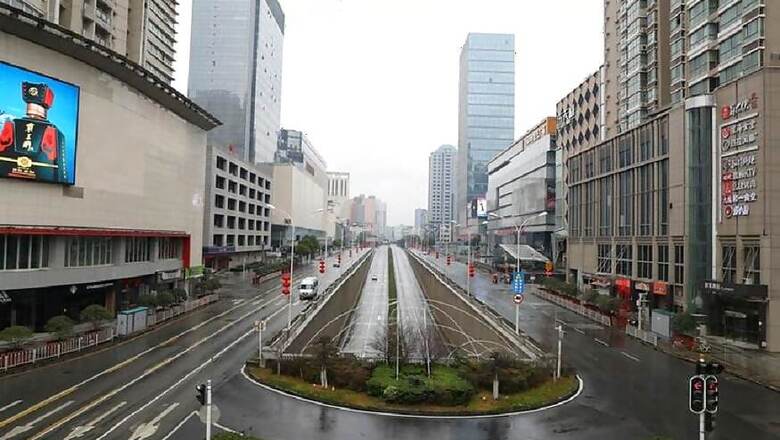
views
By the time the deadly Coronavirus outbreak was finally declared as a global health emergency at the end of last month, the impact on the various sectors of the Chinese economy was already being felt. Tech remains hit badly, with production stalled, supply chains have come to a grinding halt and companies shutting offices in the country to keep employees safe. As time has passed, the impact of what is happening in China because of the Coronavirus is being felt globally too.
The World Health Organization (WHO) has said that a US$675 million global response plan is needed to fight Coronavirus, even as the global infections have surged past 30,000. The global death toll has also crossed 800 while Chinese authorities have confirmed 3062 new cases and 97 more deaths, which takes the toll to 908 deaths and 40,171 cases in the country. China’s economy accounts for more than 16% of the global production output, and that includes everything from iPhones to copper.
With that as the backdrop, tech companies have over the past few weeks taken the decision to shut down offices and stores in China. Apple, Samsung, Microsoft, Google, Facebook, Amazon and Tesla, to name a few, took the decision to not reopen offices post the Chinese Lunar New Year holidays last month, or extended the break with the policy to work-from-home. The same is also true for Chinese companies, including Xiaomi, Huawei, Vivo and Oppo. Most companies have also restricted employees from traveling to China. Starbucks has closed 2000 outlets in China, while KFC has also shuttered thousands of outlets in the country after one of their employees was diagnosed with the Coronavirus. Yum China, which operates Pizza Hut, Taco Bell and KFC outlets in more than 1,300 cities in China, has introduced what it calls “contactless food deliveries” to protect their employees. According to reports, videos on the Chinese social media site, Weibo show delivery drivers having their temperature recorded before wearing Hazmat suits and face masks and disinfecting all food packaging while leaving the restaurant.
Factories are also non-operational in China, which is grinding the supply chain to a halt. Electronics manufacturing is disrupted significantly. At the same time, materials and components that may be required by factories located outside China, are also not being shipped. The ripple effect, unprecedented in terms of something we have never seen before. Product shipments will be hit at least in the next couple of quarters. This will also hurt the next set of product launches, because the prototyping, build stages and advance production is not happening as we speak. Perhaps, TF Securities analyst Ming-Chi Kuo’s forecast should put things in perspective. “Our latest survey indicates that the iPhone supply is being affected by the coronavirus and, therefore, we cut the iPhone shipment forecasts by 10%,” he said. Foxcon and Pegatron, two of the biggest employeers in China, make almost all of the iPhones, but that’s just one thing they do. The Nikkei Asian Review reported that the Chinese authorities have not allowed Foxcon to reopen its Shenzhen plant over Coronavirus prevention concerns. Foxconn's Zhengzhou plant has also not reopened. Apart from being the largest production base for Apple iPhones, the Foxcon factories also churn out electronics and gadgets for the likes of Google, Amazon, Dell, HP and Huawei, to name a few.
“The local governments do not want to risk the potential virus spreading in such a labor-intensive working environment. No one wants to bear the responsibility of restarting work at this critical moment,” the Nikke Asian Review reported.
Consumer prices in China have already recorded their biggest jump since 2011 as prices rose 5.4% in January as the effects of the Coronavirus disaster became clear, according to numbers by the National Bureau of Statistics, reported by the Financial Times.
Earlier this month, Asus had warned customers that there will be delays in the availability of their popular gaming phone, the ROG Phone II. They also cited the “disruption in supply chain” for the temporary shortage.
Chip maker Qualcomm has already said that the Coronavirus outbreak will cause significant uncertainty regarding supplies needed to produce smartphone processors. This will have a significant impact on the company’s ability to produce these critical components which phone makers will then use in the phones they make.
It is not just global brands who are facing delays and uncertainty. Chinese companies such as Xiaomi, Oppo, Huawei and Lenovo are facing operational delays because of the Coronavirus. “Companies which rely on components from Hubei will be the most impacted, such as Lenovo. For companies like Huawei, whose operations are in Guangdong, the situation is less severe, although no company right now will be able to resume factory operations at 100 percent capacity,” Nicole Peng, mobile analyst at Canalys, told the South China Morning Post. Oppo is relying heavily on production facilities in India and Indonesia to soften the blow.
Xiaomi is already looking at a situation where several of their products are already out of stock. “The planned release of new products has been disrupted and we are making adjustments,” said Lu Weibing, vice-president of Xiaomi in a Weibo post last month. “The smartphone industry will face difficulties this year,” Lu Weibing added.
In the short term globally, there will a gradual reduced availability of a lot of tech products that emerge out of Chinese factories, or rely heavily on components from the region. This will lead to lesser availability of products in the near future, but a lot of that will depend on how long the factories remain shut in China. Eventually, prices of tech products will also see an upward correction, which will directly hit the consumers’ wallets and budget.




















Comments
0 comment